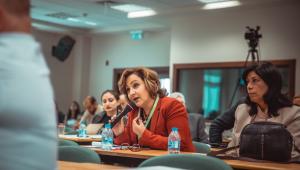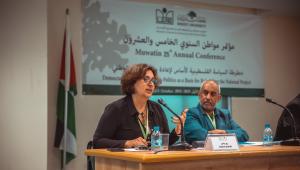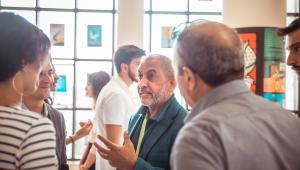Muwatin 25th Annual Conference will be dedicated to examining the past 25 years of Palestinian struggle. This year, several occasions will mark quarter a century since the Oslo Accords, the emergence of the Palestinian Authority, and the Paris Protocol. We will take the occasion to attend to some vital concerns of the Palestinian public locally and globally.
To discuss this reality, future prospects of the Palestinian cause, the perceptions of the alternatives for the formulation of the national project, and to identify internal conflicts, and common denominators, and to build the national project based on them, Muwatin’s 25th annual conference will examine, inter alia:
- The reasons behind the stagnation of the Palestinian National Project;
- The Arab environment for the National Palestinian Project and its transformations;
- International alliances of the Palestinian cause, their development, and future;
- The Palestinian cause in light of the transformations of perceptions and practices of international law;
- The political economy of the peace process, and the state-building, and its impact on the national project;
- Democratizing the internal front in Palestine;
- The desired changes in the social and political policies on the Palestinian internal level;
- Ways of rebuilding representative bodies, such as unions, ensuring their representation of the national project;
- Ways of enhancing community control mechanisms on national policies.
The conference will take place on Friday and Saturday, 4 and 5 October 2019, in conference hall (243) at Muwatin Institute located in the Institute of Law Annex Building – Birzeit University. Simultaneous translation is available
Concept Note
Muwatin 25th Annual Conference
“Democratisation of Palestinian Politics as a Basis for Rebuilding the National Project”
Planned for 4 and 5 October 2019
This year marks quarter of a century to a major transformation in the history of Palestinians. This transformation was embodied in supplementing the Oslo Agreement with the Cairo Agreement, the emergence of the Palestinian Authority (PA), and the signing of the Paris Economic Protocol as part of the "Peace Process." The failure of this process is a rare case of consensus among experts, politicians, and ordinary people of all affiliations and backgrounds.
In this sense, there is nothing to discuss about the future of the “Peace Process.” It has no future. However, there is a future for Palestinians, and their national liberation project that should be discussed in terms other than deals that do not tackle the core cause of Palestinians: their freedom, and all other rights. Thus, there is a need to review the path that resulted in the “Peace Process.”
The colonial nature of the Israeli Occupation has changed. It is more invasive and less alarmed, benefiting from additional tools for aggression and hegemony. The structure of the Palestinian resistance to occupation has also radically changed, the national project became vague, and the national liberation process became idle awaiting suitable conditions to be resumed. In the meantime, the foundations of its success are undermined by land erosion, the fragmentation of goals, imposition of new conditions, and the drying up of resources.
The Palestinian national struggle had relied, for numerous decades, on a supportive environment on both the official and popular fronts. This involved the Socialist Bloc before its collapse, the Non-Aligned Movement, Arab masses, the Islamic World, and the Global South more broadly. Palestinians have also enjoyed the support of numerous movements, parties and unions in other parts of the world that viewed Palestinians as victims of global imperialism. However, major transformations affected the system of international relations, and the powers constituting the international system – including popular forces. These transformations also affected the form, impact, and the instruments of international law, which served as a key tool in garnering international support for the Palestinian cause. These changes, in their totality, led to the reconstitutions of the Palestinian national struggle from that of a people fighting for self-determination into a technical dilemma concerned with applying an agreement, which legalizes the occupation and provides it, formally, with a contractual cover.
These transformations are not specific to the Palestinian context. They are part of broader process where the value and significance of sovereignty had retreated, and where major transformations affected international law and replaced it with statements such as “the will of the international community.” Rights became conditioned by the “will of the international community.” The legitimacy of (all forms of) resistance guaranteed under international law had eroded under the notion of the illegitimacy of the violence of resistance. This has been accompanied by more acceptance to the occupying state’s violence, and numerous forms of non-violent resistance such as the boycott movement became classified as a crime in some countries. Clearly, these changes should not distract our attention from the existence of international and popular solidarity movements with the Palestinian people, especially in an era where anti-imperial movements are re-emerging following a withdrawal that lasted nearly three decades. This re-emergence comes at a time where a process of polarization is underway, expressing itself in the fact that a number of Arab states and other historical allies are chasing after the normalisation of relations with Israel.
Regionally, there is a retreat on various levels in the support to the Palestinian cause. Arab countries are busy with their internal issues, after most of these countries reached critical levels of “exposure” on different accounts. Most Arab countries are facing conflicts mixing revolution with civil wars; proxy wars; wars against terror and foreign interventions. New enemies were also invented to these countries, and they face multiple attacks, and pressure is placed on them to change their positions towards the Israeli occupation, or to push them towards partaking in isolating Iran, or other similar actions. Arab countries are passing through their worst moments as they are divided regarding Syria, Qatar, Iran, Turkey, the relationship with the United States, and the list goes on.
To this end, the Arab regional base is no longer able -on the official level- to provide a conducive environment for the Palestinian cause. Despite the ongoing support Arab masses show towards the Palestinian people, the Palestinian cause no longer holds as the central issue for the majority of Arab masses. They are taken by their internal political and economic issues, which became more pressing in recent years. These masses view, at least in part, the Palestinian cause as one led by two governments involved in atrocities similar to those of other Arab governments with regards to their ties to foreign powers and their heavily securitized society. The Palestinian divide has also created a divide amongst supporters in the Arab world, and led to confusion, indifference, and apathy.
Internally, the Palestinian situation suffers from divisions, fragmentation, inner fighting, the lack of a liberation strategy, and the dwarfing of the national project. Fragmentation extends to the political parties, civil society organizations and public institutions. Palestinians are currently unable to unite themselves in order to face the occupation.
The Palestinian economic situation suffers from increased poverty, an increase in the gap between the rich and the poor, deepening neo-liberal economic policies (this applies to policies led by both Fatah and Hamas, as well as foreign powers and centres of power in the country). The Palestinian market functions under countless restrictions, limitations, and colonial determinants. High unemployment rates are no longer odd. Economic indicators have decreased significantly, and exposure to foreign aid is of growing impact. Dependency on the Israeli economy currently has its toll on the lives of Palestinians who feel, increasingly, that they are subject to colonial policies practiced by Israel such as the siege on Gaza Strip; restrictions on the flow of foreign aid; Israel’s control and deduction of Palestinian tax revenues; control on fishing; work permits; construction; amongst other practices.
The Palestinian economic crisis along with the lack of a clear political vision lays a huge weight on the social Palestinian fabric. Education and health have receded under the budgetary deficit, mismanagement, and corruption internally; and the siege, restrictions, racism and destruction by the occupation. Currently, abstaining from unionism, political and voluntary work has become the norm, and the status of civil society organizations have receded and their role diminished. Additionally, new forms of crime have arisen, and violence has increased.
Crisis began to affect the Palestinian society with greater intensity, and the Palestinian society became no longer able to hide its contradictions temporarily to unite in facing the occupation. People went to the streets to protest the tax law, asking for teachers’ rights, then went demanding a better social security law, and later to protest against it altogether, in a clear declaration of distrust.
Contradictions within Palestinian society have reached a level that can threaten the unity behind the ultimate goal of getting rid of the occupation, and protecting the Palestinian national identity, and other issues that have served as a common ground for the national agenda for decades. The diversity of interests, affiliations and aspirations have reached a level that cannot oversee differences for the sake of preserving unity despite the fact that rejecting the occupation remains, with no doubt, the ultimate shared goal of the Palestinians.
Previously, getting past (or at least, postponing) differences was the base for constructing the common ground for the uniting project of national resistance. However, the changes that took place over the last quarter century has changed the requirement of getting past differences into an introduction towards what is known as “post-politics” or fake political centrality. This “centrality” tends to camouflage differences and conceal from sight oppression and injustices. It leads right bearers to abstain from asking for their rights under the pretext of “political realism” that presents oppression as a destiny. This fake centrality is characterised by slogans that are empty of any political content representing those who are not powerful and attached to the process of globalisation economically and politically. It promotes the such slogans as “change” without explaining what it might constitute; “youth” without referring to the fact that they are a product of this condition, and the future of this society; “creativity” without a hint on what is to be created; and “renewal” as if there is a need to change the pace of life. These slogans do not fit a political project, not to mention one of national liberation. Such slogans are, nonetheless, able to disguise deeper contradictions than those, which surfaced and led to the Fateh – Hamas division. The inherent contradictions will eventually burst if they are not settled. Such a settlement, no matter how painful, either exists or the national project altogether will cease to exist.
The coexistence of an elusive political project alongside deep national and class contradictions, which currently categorize the Palestinian society, is impossible. Continuing to portray contradictions as solely “variations” and “disagreements” will lead to the inability of their resolution. It threatens a collapse and reaching a state of futility that cannot be overcome without a shock.
Thus, there is a need to strengthen the internal front, and re-build the national project in a manner that takes into consideration the real bases for popular and national agreements, and to be as inclusive as possible, accommodating for conflicting interests, capable of supressing narrow elite interests, when they are imposed and preferred to the public interest. There is a need for a project where liberation and the elimination of the occupation is the priority, a project that exposes such slogans such as “state,” “sovereignty,” “resistance,” when they really mean “authority,” “banks,” “security control,” and the like – the current common denominator for both the West Bank and the Gaza Strip.
Conference Rubrics
To discuss this reality, future prospects of the Palestinian cause, the perceptions of the alternatives for the formulation of the national project, and to identify internal conflicts, and common denominators, and to build the national project based on them, Muwatin’s 25th annual conference will examine, inter alia:
- The reasons behind the stagnation of the Palestinian National Project;
- The Arab environment for the National Palestinian Project and its transformations;
- International alliances of the Palestinian cause, their development, and future;
- The Palestinian cause in light of the transformations of perceptions and practices of international law;
- The political economy of the peace process, and the state-building, and its impact on the national project;
- Democratizing the internal front in Palestine;
- The desired changes in the social and political policies on the Palestinian internal level;
- Ways of rebuilding representative bodies, such as unions, ensuring their representation of the national project;
- Ways of enhancing community control mechanisms on national policies.





